I caught a small alligator once. I was fishing for bass in a golf course water trap behind an apartment complex in Titusville, Florida (that’s west across the Indian River from the space center.) I had already caught a few bass.
I was using a six-inch rubber worm, which always worked well for me. I was dropping it on the edge of the pickerel weed. I felt a small tug which is exactly what bass do, then a stronger tug. I set the hook. Then the tug got real strong, nearly pulling the rod out of my hand then nothing. Broken line, I thought, so I started to reel in. It was then I noticed a three-foot alligator swimming towards me. As I reeled in my line it went taut again. The gator had my rubber worm and was returning it, in person. For a moment I entertained tender young alligator steaks… then came to my senses, broke the line and haul my bass out of there.
Another time a friend and I were canoeing up Rock Springs Run in my 18-foot Mohawk when we startled a sunning gator. The alligator made a high jump and a big splash and went under the front of the canoe. As I was in the back some 15 feet away I was not too concerned… My friend, however, kept his soiled pants as a souvenir.
My last close encounter with the cold-blooded kind came only a couple of years ago. I was kayaking, again, up Rock Springs Run. The run varies, sometimes wide and shallow with no channel, at other times with a ten foot wide and deep channel. I was planning on heading upstream a few miles, turning around, then floating down while videoing plants, and eventually that is what I did. However, while going upstream I noticed two baby alligators floating on a Nuphar root. They were cute, about six inches long. I thought they would make excellent footage for my video.
Since I noticed them as I passed the easiest thing to do was to stop paddling and just float backwards rather than turn around, let the current take me to them. By chance I happened to be wearing polarizing sunglasses that eliminated glare off the water. As I floated back toward the babies a huge alligator swam under the kayak and stopped between me and the little ones… I decided I didn’t need any footage of baby alligators. Reptilian mothers can be formidable, and she was longer than my kayak.
Not only have I encountered alligators in the wild but in the kitchen as well. I wish I could recommend alligator more wholeheartedly than I can. After all, I live in Florida and have had alligator many times prepared many ways.
Does it have a bad flavor? Not really. Is the texture off-putting? No. People say it tastes like chicken. If that’s the case than the chicken died from drinking a lot of swamp water. Alligator always has, to me, a bit of tooth and swampness about it. To your palate there’s never any doubt as to what you are eating.
Now, don’t misunderstand me. I eat everything, literally. There is no food I won’t eat. I don’t have any off-limit foods. In that regard I’m an easy dinner companion, guest, or co-pizza orderer. I eat everything. If you put a plate of gator in front of me down it goes, pass the Pickapeppa sauce please. These are just my observations about alligator.
The texture is more like our larger game fish, and the flavor is more towards an oily sea fish than grain-fed chicken. Some “healthy meat advocates” say it tastes like mild white flesh fish, cod and tilapia and the like. I don’t know where they are getting their gator from but no gator I have ever eaten tasted that mild or delicate. Gator and sherry are not made for each other. Gator calls for accompanying flavors and seasonings to have some oomph to them. Marinades are your friend. (If someone introduces me to mild gator meat I will gladly rewrite the previous paragraph.)
That said there are many things to recommend alligator meat. Here is a commercial view of gator meat: A four-ounce serving has 177 calories, beef 244. Alligator meat is 3% fat, beef is 12 though personally I think our anti-fat craze is not healthy. There is also the argument that alligator is more healthy than beef. That might be debatable. If caught in the wild, perhaps. If raised on a farm, perhaps not. About 100,000 alligators are farm-raised whereas several million run wild from Texas to North Carolina. Louisiana and Florida alone total three million wild alligators. Locally one sees them all the time from golf courses to even walking along the Interstate, and dead on the Interstate.
The state of Florida is not so nutritionally generous. It says a 3.2 ounce serving (smaller than above) has 232 calories, which would make gator meat more caloric than beef. The state also says it is more fatty, 4 grams per 3.2 ounce serving putting it at 4% fat, not 3%. According to the state gator meat is nearly half protein. Alligator meat is usually frozen — cough cough — and sold as ribs, fillets or steaks. The latter two are cut from the tail which is the whitest and most tender of the meat. Other meat leans towards pork in color and texture.
Actually there are eight cuts on an alligator: Top of the neck G (this has to be cubed, stewed or beaten silly with a mallet.) The jaw, A, which is very tender, as is the tail meat, T. The lower neck meat, O, is like the top of the neck, read tough. The backstrap, R, is tender. The body meat, B, average. Leg meat L must also be beaten into submission.
As you might surmise tail and jaw meat are the most tender and mild. The rest has to be tenderized, from pounding to cutting across the grain to cubing. Tougher cuts are also ground to make burgers, meat loafs, soups, stews and chili. Marinades can reduce bad flavors and increase desired ones. All yellow fat should be removed before freezing or preparing or you will really taste the swamp.
Americans are already eating alligator, from one to 1.5 million pounds per year at $8 to $10 a pound, not cheap. It is strongly recommended you soak any and all alligator meat in milk three hours before prepping and cooking it. That reduces the swamp notes.
Alligator Nuggets by Bobby Flay
Ingredients
• 1/2 pound alligator meat, cut into 1/2-inch cubes
• Fish batter, for coating (see *Cook’s Note)
• Cooking oil, for frying
• Salt and freshly ground black pepper
• Serving suggestions: various dipping sauces such as remoulade, mustard or cocktail
Directions: Fill a deep pot halfway full with oil. Heat to 360 degrees F. Coat the alligator meat with the fish batter. Fry for 2 to 3 minutes, until gator floats in oil. Remove and add salt and pepper to taste. Serve as an appetizer with remoulade sauce, mustard sauce, or cocktail sauce for dipping. * Cook’s Note: We prefer Golden Dip brand fish batter, but if store-bought batter is not available in your area you can substitute flour seasoned with salt and pepper.
Fried Alligator, originally from Acadiana Profiles Cajun Cooking from the kitchen of South Louisiana.
1 to 5- pound piece of alligator tail, rinsed and chopped into 1 1/2 -inch pieces.
1 quart of whole milk.
1 small bottle of Frank’s Red Hot Sauce.
1/2 teaspoon sea salt.
1 large potato, boiled.
1 small bell pepper, finely chopped.
1 clove garlic, minced.
Salt and pepper to taste.
2 cups seasoned, bread crumbs.
Oil, for deep frying.
Marinate the alligator in the milk, hot sauce, and salt solution. Marinate should cover the alligator or place in zip lock bag and turn occasionally.
Place in the refrigerator for 24 hours. Drain
Dry on paper towel.
Grind alligator coarsely in food processor.
Mix coarsely ground alligator with boiled potato, bell pepper, garlic , salt and pepper.
Form into round balls and toss in seasoned bread crumbs.
Drop into hot oil and deep fry until golden brown, 3-5 minutes.
Drain on paper towel. Serve immediately.
Alligator Sauce Piquant by Rouses Louisiana’s Best
 Ingredients:
1/2 cup of flour,
1 cup Rouses cooking oil,
1 large. onion, chopped,
1 garlic clove, chopped
, 1/2 bell pepper, chopped,
1 large can of tomatoes,
1 can of tomato sauce,
3 cups water.
Rouses salt and pepper to taste,
1 pound of alligator, cut into one inch cubes,
1/2 cup onion tops, chopped.
Ingredients:
1/2 cup of flour,
1 cup Rouses cooking oil,
1 large. onion, chopped,
1 garlic clove, chopped
, 1/2 bell pepper, chopped,
1 large can of tomatoes,
1 can of tomato sauce,
3 cups water.
Rouses salt and pepper to taste,
1 pound of alligator, cut into one inch cubes,
1/2 cup onion tops, chopped.
Directions: Make a roux by cooking flour in oil until medium brown. Add onion and cook until onion wilts. Add garlic, bell pepper, tomatoes, tomato sauce and water. Cook over low heat for 30 minutes. Add alligator meat, salt and pepper and onion tops; continue cooking until alligator meat is tender, about 30 to 45 minutes.

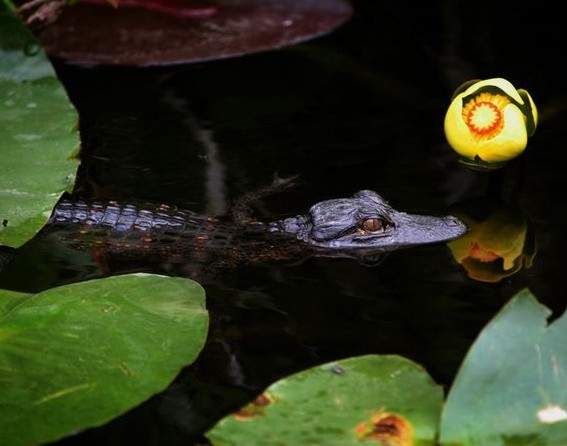
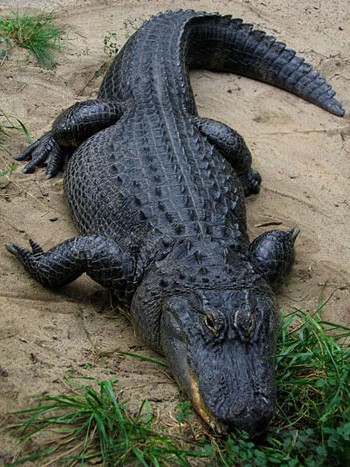
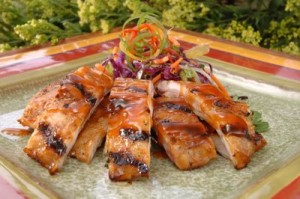
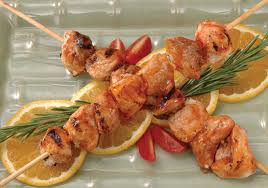
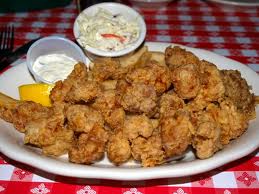
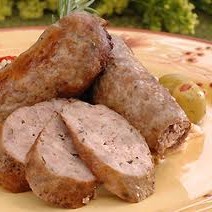
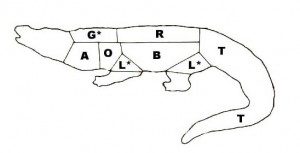


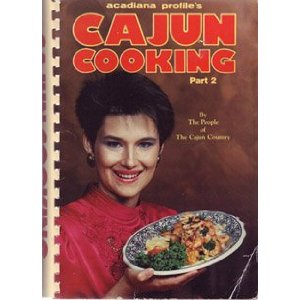

Yes I have had my share of gator tail. lol Fried nugget city. It is actually good eating. Not the table fright everybody imagines. When I was younger, a buddy of mine had gator tail at his house all the time. He preferred the younger three to four footers because the meat was more tender. He did a lot of frog gigging too so he had frog legs up for grabs also.
The tip about milk soaking is a good one for removing the “gamey” taste. I do that with fish fillets a lot.
[quote]They can run as fast as a horse. Can you?[/quote]
No, but then again gators don’t climb trees.
I had a friend once who poached gators out of Yulee, Florida. These gators lived in the brackish marshes not far from the ocean. I guess the salt water kept them from tasting swampy, they had the texture of pork chops with a slight fish flavor, quite mild.
If it was in brackish water it was a Florida crocodile, Alligators cannot survive salt water. That would also acount for the difference in flavor
Yulee is too far north for the Florida crocodile; as I understand their range, they are confined to the coast along the Everglades in far southern Florida. I routinely encounter alligators in the brackish bayous in the greater Houston, TX area — in the same water where people fish for blue crabs. They seem pretty tolerant of brackish water — I’ve seen large ones within a few miles of the coast just north of the intracoastal waterway.
I live just east of lake okeechobee and have had my share of gator parts, the biggest thing to preparing gator, in my opinion, is removing all fat and gristle possible.soaking in milk and eggs then roll in pan cake mix then fry.add your own spices but the pancake mix makes a nice sweet crunch
Just got done frog giggin the other night and I was thinking you should do a page on the pig frogs and bullfrogs, they are easy to get and if your hunting gators they are all over. Also the small harmless gators 4″_3′ long eat them and activley hunt them so you could get a double whammy of food while having fun. I can email you some awesome recipes for some awesome bullfrog legs. They taste better than chicken wings I think, more tender and sweet white meat
Good morning Deane,
While I have never prepared gator, I have had my fair share of fish to cook. Here in Missouri, sometimes we catch mud cats (local term for the Black Bullhead). They are often found in muddy ponds and can carry a muddy flavor. Other fishes can also carry off flavors, depending on when and where caught.
In order to counter this off flavor, I have found that – rather than milk – if you soak your fish for 30 minutes to overnight in, oh, perhaps a teaspoon to a tablespoon (depending on how much water) of Baking Soda and water, the fish will be firmer and sweeter and the off flavors better removed. I would think this would work for gator as well.
Looking forward to your next article and video.
*Re: edible-flowers-part-twenty, I am having a bit of difficulty finding a good source of Quince. Any chance I could obtain a rootable cutting from you sometime?
Actually my mother in Maine has a lot of quince growing. Perhaps we can get some to you.
Sounds nothing like the gator I had in Louisiana. It’s very, very mild; so inoffensive it verges on bland. It’s markedly chewy, and while not exactly like chicken, it’s the closest comparison tastewise. Nothing like to farm-raised catfish, which almost always has a strong muddy/swampy taste. I’m not sure where the restaurants got their meat–it was probably frozen farmed tail meat–or how they prepped it, aside from a lot of pounding being involved.
Your gator was farm raised and canned.. just imagine a giant concrete pool filled with hundreds of gators, then all the spoiled meat that is thrown to them for food.. then all of the crap they crap in the water… then they soak in it.
that is an alligator farm. They come from there tasting exactly like that water.
Fresh killed out of the local river or lake is a whole nother story… last batch i made a friend told me tasted like scallops.. he was amazed.
farm raised and canned is nasty.
Also soaking anything in milk is just a waste of good milk, that includes buttermilk.. it is a fairy tale.
I came across this page while sitting here eat gator leg stew I made a few days ago so I felt it was apropo that I make a few points I hadn’t seen made. When cooking gator prepping the meat is everything.
Remove as much of the connective tissues and fat as possible, the tissues don’t break down well and the fat will make it taste like the water it came from.
When cutting the meat it is essential that you cut across the grain of the meat I feel this helps with the chewiness more then even beating it.
In my experience a meat cuber or a hand jaccard work best to tenderize.
If you are going for a marinade avoid too high of an acid for too long the meat will start to cook in the acid like a ceviche but without the heat to break down the connective tissue leaving you with tough and chewy gator. I prefer buttermilk if i marinade at all.
On a side note: Even though prolonged exposure can be very harmful to them gators can be found in saltwater. I live 200 yards from the Gulf of Mexico and I have seen them crossing the bay as well as living on salt flats or marshes. There is actually a small gator living in the brackish ditch across from my house right now.
Love the Website Green Deane appreciate all you put into it.
Thanks for the details. It was interesting that it is the fat that conveys the environmental flavor… I will have to remember that…
The platter of gator nuggets and cole slaw looks to be at Catfish Johnny’s in Lake Panasoffkee. A true Florida gem.